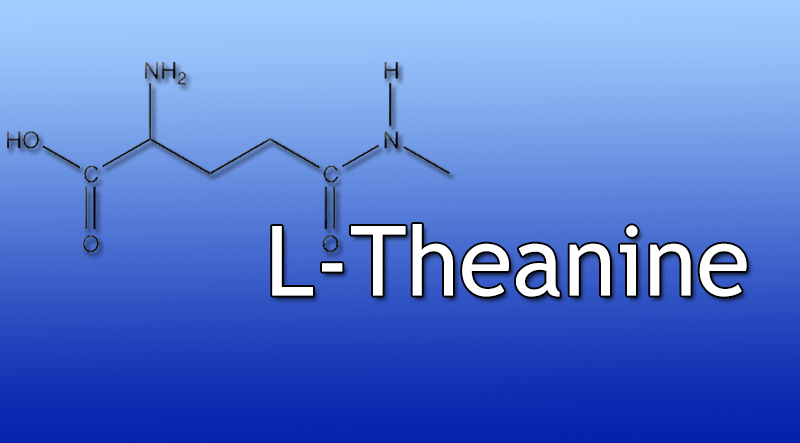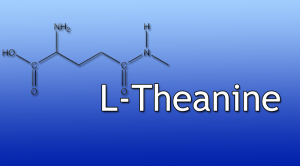Last updated on September 22nd, 2016 at 12:06 am
L-Theanine is an amnio acid found in teas, particularly green and black tea. It has been shown to be synergistic with caffeine and possesses unique benefits of its own.
Table of Contents
What L-Theanine does
Because it increases GABA, an inhibitory neurotransmitter, it can induce relaxation and decrease stress response. Therefore, L-Theanine can reduce both physical and mental stress. Stress is detrimental to cognition and by reducing stress response, one can retain their peak cognitive function during what would otherwise be stressful events. Chronic stress has a large toll on the body and can largely affect cognition in a negative manner. Some symptoms of chronic stress include:
- Depression
- Anxiety
- Intense mood swings
- Poor concentration
- Poor motivation to complete tasks
- Insomnia
By reducing stress response, L-Theanine is able to effectively reduce or even eliminate the effects of chronic stress on cognitive functioning. As it also promotes relaxation, it can reduce anxiety and aid in sleep. Anxiety negatively affects mental performance, memory, and overall cognition. Sleep is also important for memory, learning, and overall cognition and poor sleep quality has been linked to decreased mental performance, increased sleep time, and poor energy upon waking up. Therefore, by promoting relaxation, L-Theanine is able to enhance sleep quality and reduce the effects of poor sleep quality on cognitive functioning.
How L-Theanine works
L-Theanine is an analog to glutamic acid as well as glutamine and readily crosses the blood-brain barrier. There, it increases dopamine release in the brain and increases overall levels of the inhibitory neurotransmitter, GABA, which induces relaxation and helps prevent insomnia.
Side effects
L-Theanine is remarkably safe and there have been no reported side effects from its use. Even at extremely high doses, it is still safe and shows little to no harmful psychological and physical effects.[8]
Dosage and how to take L-Theanine
A typical starting dosage for L-Theanine is 100 mg. Because L-Theanine is sedating, many users take it concurrently with caffeine to attain a synergistic effect. Caffeine and L-Theanine are two contrasting substances in that caffeine is energizing and L-Theanine is sedating, however, combining the two does not cancel their positive effects, but does cancel their adverse effects. By combining the two, users can enjoy the benefits of caffeine’s wakefulness and energy-boosting properties while simultaneously reducing caffeine’s negative effects, such as anxiety, restlessness, and other negative effects caused by excessive stimulation.
L-Theanine can also be used to enhance sleep quality due to it being a sedative. Taking it with extended-release Melatonin can further enhance sleep quality.
Where to buy L-Theanine
The best place to buy L-Theanine is from Amazon as they have the lowest prices and best quality brands available. They also ship fast and have excellent custom support.
Click here to buy L-Theanine from Amazon.
Visit the Where to buy Nootropics page for more places to buy L-Theanine.
References
1. K, Kimura, Ozeki M, Juneja LR, and Ohira H. “L-Theanine Reduces Psychological and Physiological Stress Responses.” Biological Psychology 74.1 (2007): 39-45. National Center for Biotechnology Information. Web. <http://www.ncbi.nlm.nih.gov/pubmed/16930802>.
2. Yokogoshi, Hidehiko, Miki Kobayashi, Mikiko Mochizuki, and Takehiko Terashima. “Effect of Theanine, R-Glutamylethylamide, on Brain Monoamines and Striatal Dopamine Release in Conscious Rats.” NEUROCHEMICAL RESEARCH 23.5 (1998): 667-73. SpringerLink. Web. <http://www.springerlink.com/content/v666n4858vx1g750>.
3. ZHENG, GUODONG, KAZUTOSHI SAYAMA, TSUTOMU OKUBO, LEKH RAJ JUNEJA, and ITARO OGUNI. “Anti-obesity Effects of Three Major Components of Green Tea, Catechins, Caffeine and Theanine, in Mice.” In Vivo 18.1 (2004): 55-62. National Center for Biotechnology Information. Web. <http://www.ncbi.nlm.nih.gov/pubmed/15011752>.
4. Kakuda, Takami. “Neuroprotective Effects of the Green Tea Components Theanine and Catechins.” Biological and Pharmaceutical Bulletin 25.12 (2002): 1513-518. J-STAGE. Web. <https://www.jstage.jst.go.jp/article/bpb/25/12/25_12_1513/_article>.
5. F., HASKELL Crystal, KENNEDY David O., MILNE Anthea L., WESNES Keith A., and SCHOLEY Andrew B. “The Effects of L-theanine, Caffeine and Their Combination on Cognition and Mood.” Biological Psychology 77.2 (2008): 113-22. CAT.INIST. Web. <http://cat.inist.fr/aModele=afficheN&cpsidt=20069292>.
6. Lekh Raj Juneja, Djong-Chi Chu, Tsutomu Okubo, Yukiko Nagato, Hidehiko Yokogoshi, L-theanine—a unique amino acid of green tea and its relaxation effect in humans, Trends in Food Science & Technology, Volume 10, Issues 6–7, June 1999, Pages 199-204, ISSN 0924-2244, 10.1016/S0924-2244(99)00044-8. <http://www.sciencedirect.com/science/article/pii/S0924224499000448>
7. AB, Kamath, Wang L, Das H, Li L, Reinhold VN, and Bukowski JF. “Antigens in Tea-beverage Prime Human Vgamma 2Vdelta 2 T Cells in Vitro and in Vivo for Memory and Nonmemory Antibacterial Cytokine Responses.” National Academy of Sciences of the United States of America 100.10 (2003): 6009-014. National Center for Biotechnology Information. Web. <http://www.ncbi.nlm.nih.gov/pubmed/12719524>.
8. JF, Borzelleca, Peters D, and Hall W. “A 13-week Dietary Toxicity and Toxicokinetic Study with L-theanine in Rats.” Food and Chemical Toxicology 44.7 (2006): 1158-166.National Center for Biotechnology Information. Web.<http://www.ncbi.nlm.nih.gov/pubmed/16759779>.
9. N, Egashira, Ishigami N, Pu F, Mishima K, Iwasaki K, Orito K, Oishi R, and Fujiwara M. “Theanine Prevents Memory Impairment Induced by Repeated Cerebral Ischemia in Rats.” Phytotherapy Research : PTR 22.1 (2008): 65-68. National Center for Biotechnology Information. Web. <http://www.ncbi.nlm.nih.gov/pubmed/17705146>.


